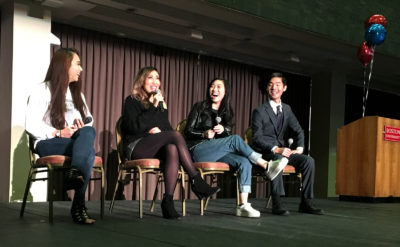
Following the early 2017 controversy of “whitewashing” the film adaption of Japanese manga “Ghost in the Shell,” there have been strides in attempting to address the issue of Asian and Asian-American representation in media.
Shows like “Fresh Off the Boat” and “Master of None” have brought about a renaissance of diversity in the entertainment industry, showing that Asians have more to offer than the color of their skin.
Boston University’s Asian Student Union hosted their first-ever lecture series “Breaking Boundaries” Saturday night to discuss just that. The speaker panel consisted of TEDx presenter Canwen Xu, rapper and actress Nora Lum, health and fitness influencer Cassey Ho, and activist and YouTube sensation Kevin Wu.
“We wanted to create this platform so we could bring these inspirations to our audience and make them want to do something about Asian representation,” Ivanna Lin, president of ASU and senior in the College of Fine Arts, said.
The presentation reiterated ASU’s mission of raising “awareness about Asian and Asian-American issues both within Boston University and the wider community,” according to the group’s website. Although the talk was hosted at the George Sherman Union on BU’s campus, it drew attendees from all around Boston.
“Half of the audience were from BU and the other half were students from other campuses, so that was one thing that we’re really happy about, because we’re not just reaching out campus grounds, but also Boston as a whole,” Lin said.
The panel, made up of influencers with large social media followings, specifically targeted Asian and Asian-American representation in the media.
After Lin’s opening remarks, Xu, a sophomore at Columbia University, shared her sentiments on Asian and Asian-American representation in the context of her own experiences living in predominantly white neighborhoods and often being the only Asian in situations.
She said all Asians are compared to a stereotypical model — good at math and science, on track to be a doctor or lawyer, can’t drive.
“I’ve been told I’m pretty for an Asian,” Xu said. “I’ve been told I’m ugly for an Asian. I’ve been told I’m smart [or] dumb for an Asian. I’ve been called every variation of that.”
Not only is this separation from the community stemmed from her comparison to the stereotypical standard, Xu said that the simple question of “Where are you from?” works to the same effect.
“When I’m living in some place … and people know that my parents work there and people know that I go to school there or people know I’ve been a long-time resident there, and then they still ask ‘Where are you from?’ the question is no longer where are you actually from. It’s like ‘Why do you look so different from us?’” Xu said.
Lum, another panelist under the stage name Awkwafina, spoke about pursuing her passion for rap, despite disapproval from her parents and a lack of Asian participation in the industry.
Ho, a health and fitness entrepreneur, is best known to her fans as Blogilates. Ho said she refused to follow the career paths set before her by her parents — either medicine or law — and find her way down a more creative path.
Now teaching pilates on her YouTube channel and creating her own brand of live classes, POP Pilates, Ho said she went from living on Commonwealth Avenue in her 20s to managing her own business and the No. 1 fitness channel on YouTube.
Closing the night, Wu, known as KevJumba on his popular YouTube channel, gave a heartfelt presentation addressing rumors and explaining his disappearance from social media.
Meilin Chan, a sophomore in the College of Arts and Sciences, said she enjoyed the talk, having been a fan of the speakers in the past. She said their impact as Asian-American influencers makes great strides in the direction of normalizing Asian participation in the entertainment industry, though there is still work to be done.
“There are so many Asian entertainers having their voice out now, and they’re not afraid to voice their opinions, but I hope to see more Asians in the entertainment industry, like behind the scenes as well, like in writer’s rooms, in producing, directing, in everything — not just on the screen,” Chan said.
Xu said that there is a bigger picture at hand regarding Asian and Asian-American representation, one where race is a non-factor in everyday life.
“I really think the end goal is still a world in which race does not affect how we perceive a person,” Xu said, “that when we see someone and we notice their skin is a different color, it’s just like if we saw someone and saw that their hair was blonde.”


























































































































